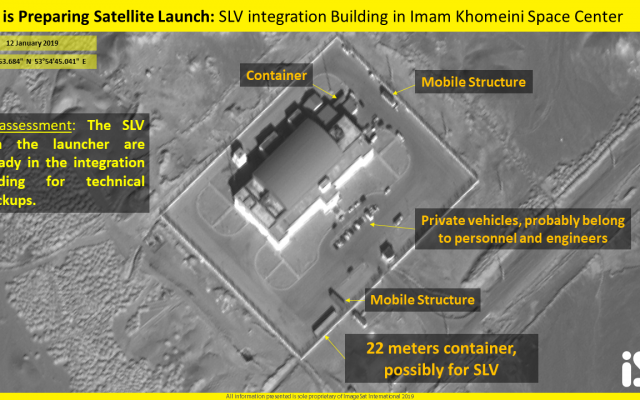
Israeli air strikes have caused extensive damage to an ammunition warehouse at the Damascus International Airport.
Images released earlier this week, from Israeli satellite company ImageSat International, proved the raid was successful despite misleading reports following last Friday’s mission.
A trio of craters now mark where the compound, which housed Iranian Fajr-5 missiles, among numerous artillery, was sited.
Shrapnel damage can also be seen on aircraft nearby.
Syrian Transportation Minister Ali Hammoud confirmed to Russian Sputnik news agency that the Israeli raid put a number of planes “out of commission” and buildings had been damaged.
Prime Minister Benjamin Netanyahu confirmed Israel had conducted “hundreds of air strikes” on Iranian targets on Monday, claims which were initially disputed by Iran.
“Israel’s claims that it has hit 200 Iranian targets over the past two years are baseless and false,” reportedly said Iranian Foreign Ministry Spokesman Bahram Qassemi. “It’s only an attempt by the Zionists to conceal their ongoing failures in the region.
“The Zionists always spread lies and embark on psychological warfare to achieve their evil goals in the region. Iranian officials are in Syria strictly for consultation purposes. The Syrian government invited us in order to advise them on methods to fight terrorism.”
Netanyahu though was clear in his assertion.
“The wave of recent attacks proves we are determined more than ever to act against Iran in Syria,” Netanyahu said during a weekly cabinet meeting.
Netanyahu’s comments came after paying tribute to IDF Chief of Staff Lt.-Gen Gadi Eisenkot, who stepped down from a four-year tenure completing 40 years service on Tuesday.
Eisenkot, meanwhile, noted that Israel had carried out “thousands” of sorties as part of an undercover campaign against Iranian entrenchment in the Golan Heights, as was published in articles over the weekend.
“We struck thousands of targets without claiming responsibility or asking for credit,” Eisenkot told The New York Times.
Eisenkot explained that attacks on convoys of Iranian weapons from Syria to Hezbollah in Lebanon began in 2011, but Iranians were not directly targeted.
Daily raids started in 2017 when, according to Eisenkot, Israel dropped 2,000 bombs in 2018.
“We began attacking systematically a number of times each week. Without making any statements. Beneath the radar,” said Eisenkot.
“We have intelligence superiority in this area. We enjoy complete aerial superiority, a strong deterrence,” he added.
Eisenkot told ministers Israel did not have a choice or they would pay a long-term price. The Cabinet eventually approved his proposals.
Iran subsequently responded but Israel hit back, striking a dozen targets in Syria.
Further skirmishes continued over the ensuing months.
A number of cabinet ministers, along with former minister Ehud Barak, who served as Netanyahu’s Defence Minister, criticised Netanyahu and Eisenkot for confirming Israeli airstrikes.
“Exposing (the raids) was completely unnecessary,” Barak told Army Radio.
Ministers warned that Netanyahu’s comments could herald an escalation of violence on Syrian and Iranian fronts.
Relations with Russia could be affected. But there was ministerial support for the Israeli leader.
“At this time and under these circumstances, we must maximise our operational activities as a means of pressure against Iran and its proxy Hezbollah,” said Transportation Minister Yisrael Katz.
There was a feeling among Netanyahu supporters that Israel must warn Tehran against Iranian action in Syria.
“There are always considerations for and against revealing Israeli activity abroad,” said former national security adviser Yaakov Nagel.
“Israel will do everything in its power to prevent Iran from crossing red lines, it has to protect its citizens.”
By Leah Waxler









